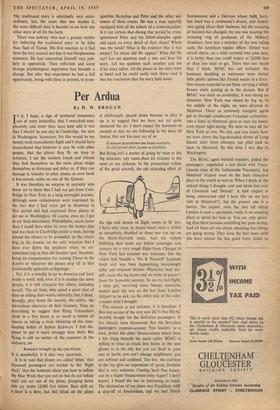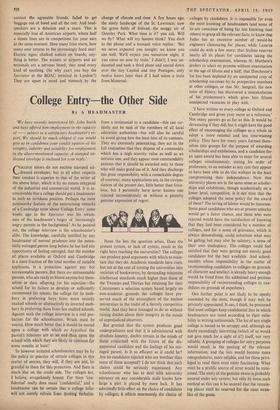Per Ardua
By D. W. BROGAN IT is, I hope, a sign of perennial innocence, not of mere imbecility, that I remarked com- placently and more than once how odd it was that I should be one day in Cambridge, the next in Washington. Innocence, for this would be my twenty-sixth transatlantic flight and I should have remembered that however it may be with other people, that the planes they fly on keep to schedule, I am the modern Jonah and friends who find themselves on the same plane resign themselves to diversion and delay or, if they can manage it, transfer to other planes or even book a last-minute cabin on one of the Queens.
It was therefore no surprise to anybody who knew me to learn that I had not got from Cam- bridge to New York in a long overnight journey, although some connoisseurs were impressed by the fact that I had twice got to Montreal in that period and had employed three planes to get me to Washington. Of course, even so, I got to my final destination, Philadelphia, much faster than I could have done by even the fastest ship and was back in Cambridge inside a week, having missed the chance to be grounded, on the return trip, in the Azores, on the only occasion that I have ever flown the southern route; an un- scheduled stop at that old familiar spot, Shannon, being no compensation for missing Flores in the Azores or wherever the planes stop off in that traditionally agreeable archipelago.
Yet, it is a novelty to go to America and back inside a week, and, even if it is routine for some people, it is still romantic for others, including myself. The air lines, who spend a great deal of time on selling their wares, naturally, but, I think, Wrongly, play down the novelty, the oddity, the miraculous character of their business. They do everything to suggest that flying Columbus's . route in 'a few hours is as much a matter of course as taking a train (thinking of the time- keeping habits of British Railways, I feel dis- posed to put it more strongly than that). But flying is still no matter of the romance of the ordinary, no Romance brought up the nine-fifteen.
It is wonderful; it is also very uncertain.
It is in vain' that planes are called 'ships,' that favoured passengers are invited to the 'flight deck,' that the hostesses show you how to inflate the Mae Wests that you put on but do not inflate until you are out of the plane, plunging down into icy water 24,000 feet below. Boat drill on a liner is a bore, but this ritual on the plane is deliberately played down because to play it up is to suggest that we have not yet quite mastered the air. I don't expect the hostesses to remind us that we are following in the wake of Icarus, that our kin may say of us
11 mound poursuivant une haute aventure; Le del fat son desk, la mer sa sepulture.
But flying isn't a matter of going by train or the big steamers, any more .than air sickness is the same as sea sickness. In the pressurised cabins of the great aircraft, the old sickening effect of the ups and downs of flight seems to be less. I have only once, in recent times, seen a victim as completely disabled as those one can see on the Hook-Harwich route. And the violent buffeting that made my fellow passenger non compos on a very rough flight from Chicago to New York last summer was welcome. For the victim had bought a 'Do It Yourself' hypnosis book and was busy hypnotising increasingly sulky and resistant victims. Physician, heal thy- self; came the big heave and we were at peace— from the hypnotist anyway. So on my last flight, a little girl, surviving some bumpy moments, waited until she was on the bus from London Airport to be sick, on the other side of the aisle; a model child I thought.
The menace is not sickness; it is boredom. I flew out on one of the very new DC7s that BOAC recently bought for the first:class passengers. It has already been discovered that the first-class passengers, expense-account 'free loaders' to a man, prefer the older Stratocruisers which have a bar slung beneath the main cabin. BQAC is willing to issue as much free booze in the new planes as in the old, but you are fixed in your seat or berth; you can't change neighbours; you are cabined and confined. The bar, the stairway to the bar give an impression of space, freedom that is very welcome. Coming back Pan-Ameri- can on a Super Stratocruiser (why Super? I don't know), I found the bar as interesting as usual. The destination of my plane was Frankfurt, with a stop-off at Amsterdam, and We had Dutch businessmen and a German whose bald, back- less head was a cartoonist's dream, and Ameri- cans going about their business, but the meaning of business has changed, for one was wearing the revealing ' ring of graduates of the Military Academy; here was a member of the new ruling caste, the American regular officer. Dinner was served above, on a table screwed into your seat; it is better than one could expect at 24,000 feet or than one used to get. There was one touch that, I think, BOAC has not imitated; the hostesses doubling as waitresses wore dainty little plastic aprons like French maids in a farce. One almost expected to see them carrying a whisk broom while putting us in the picture. But if BOAC was short on soubrettes, it was strong on initiative. New York was closed \by fog so, in the middle of the night, we were diverted to Montreal. There an extremely energetic agent got us through complacent Canadian authorities, into a hotel in Montreal, gave us time for lunch, even minor sight-seeing. We were to take off for New York at two. We did, and two hours later we were above the fog-shrouded shores of Long Island; after three attempts, our pilot took us back to Montreal. By this time I was due in Washington.
The BOAC agent worked wonders; polled the passengers, negotiated a new plane with Trans- Canada (one of the fashionable Viscounts), but Montreal Airport must be the least attractive place in the world to wait in. When I think of the unkind things I thought, said and wrote last year of Cleveland and Detroit! A new airport is being constructed (did I hear this on my last visit to Montreal?), but the present one is a horror. No airport, even the best (of which London is now a specimen), really is an amusing place to spend the time in. You are only spend- ing time there because something has gone wrong. And air lines are coy about admitting that things are going wrong. They keep the bad news until you have missed the last good train, failed to contact the agreeable friends, failed to get baggage out of bond and all the rest. And loud- speakers are a delusion and a snare. This is especially true of American airports, where half a dozen lines are in competition for your ears at the same moment. How many false starts, how many sour returns to the increasingly hard seat! Electric signs; chalked notices on boards; any- thing is better. The waiters at airports and air terminals are a nervous breed; they need every kind of soothing. (So why can't you buy the Spectator at the BOAC terminal in London?) They are upset in mind and stomach by the change of climate and time. A few hours ago, the steely landscape of the St. Lawrence; now the green fields of Ireland, the muggy air of Osterley Park. What time is it? you ask. Will we fly? What will my hostess think? You dash to the phone and a tranquil voice replies : 'But we never expected you tonight; we know you too well. We'll expect you tomorrow night, if you come on now by train.' I didn't; I was un- daunted and took a third plane and soared down over the tiny Capitol and tiny Pentagon, only twelve hours later than if I had taken a train from Montreal.



































 Previous page
Previous page